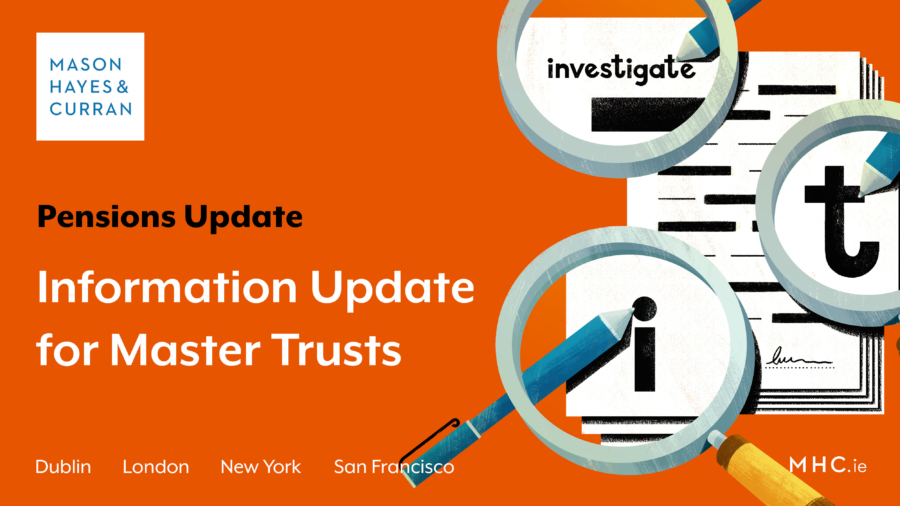Information Update for Master Trusts

The Pensions Authority (the Authority) released an information update on master trusts regarding the impending 1 July 2022 compliance deadline with the new provisions of the Pensions Act 1990 (as amended). This follows the transposition of the IORP II Directive in April 2021 and the Code of Practice for trustees of occupational pension schemes and trust RACs (the Code). The update includes several key questions regarding the issues set out below.
Trustee
The Authority clarified that the trustee must be incorporated as a designated activity company (DAC) with the sole purpose of being the trustee for only one master trust. However, an individual can act as a director of several master trust DACs provided they are separate legal entities and there is no conflict of interest.
An independent director or chair of the trustee DAC must have no interest in the assets of the master trust or have any recent association or connection with the shareholder or the master trust service providers other than in the capacity as a trustee. Recent in this context means a minimum of 3 years unless extended by the Authority.
Trustee DAC directors must also either satisfy the qualification or the experience requirement. Consulting is not counting as experience, unless the consultant meets the qualification requirement. The Authority provides details of the trustee qualification requirements on its website here
Capitalisation
If the founder ceases business or withdraws its support, the master trust must have sufficient capitalisation to continue operating and organise an orderly wind-up without negatively affecting its members’ assets. Projected income from the master trust assets or other sources may not offset the reserve requirement as this is not guaranteed income. The capital must be specifically held for the master trust, and any capital held for compliance with other legislation is not sufficient.
The minimum amount of capital is set out in the Code. However, the Authority clarified it is not its intention to produce an exhaustive list of possible capital arrangements and will consider alternatives on a case-by-case basis. The capital reserve can, however, be made available either as a capital contribution to the trustee DAC or through an escrow account with a legally binding letter of credit from the founder to the trustee DAC. The trustee DAC must always have access to the capital reserve.
Continuity plan
The trustee must have a central role in the development and approval of the master trust continuity plan and understand how the master trust will grow in a way that ensures member interests are protected. The trustee should engage with the founder on plans to transfer existing clients to the master trust and be satisfied this is feasible in an operational capacity and there is enough capital to undertake this. The Authority clarified that no master trust continuity plans will be endorsed/approved by it prior to or after 1 July 2022. This is a matter for the trustee solely and if any issues are identified by the Authority during engagement with a master trust, this will be raised with the trustee directly.
Charges
The Code states that a six-month notice must be given regarding an increase in charges. The Authority clarified that in some circumstances it may not be beneficial to the members to delay strategic decisions if there is only a marginal change to the annual management charge.
Marketing of the scheme and new members
The Authority confirmed that the trustee must ensure that all marketing information given to the members is not misleading and must be consistent. In general terms, trustees must agree with the admission of new members and be satisfied with the terms on which new members join, particularly in relation to charges. The members/employers must have been given accurate information and there must be sufficient capacity to deal with incoming members.
Reporting to the Authority
The Authority confirmed that any breaches of capital requirements, wind-up decisions and changes in control of the trustee DAC should be submitted in writing by the trustee to the dedicated lead supervision within the Authority.
Any key function holders appointed from within the founder organisation is considered to be outsourcing and must be notified to the Authority in accordance with the Code.
Conclusion
Ensuring timely compliance and understanding the details and requirements of the new Act and the Code is essential for the required management of the master trust. The deadline of 1 July 2022 is fast approaching. For more information and expert advice, contact a member of our Pensions team.
The content of this article is provided for information purposes only and does not constitute legal or other advice.
Share this:


